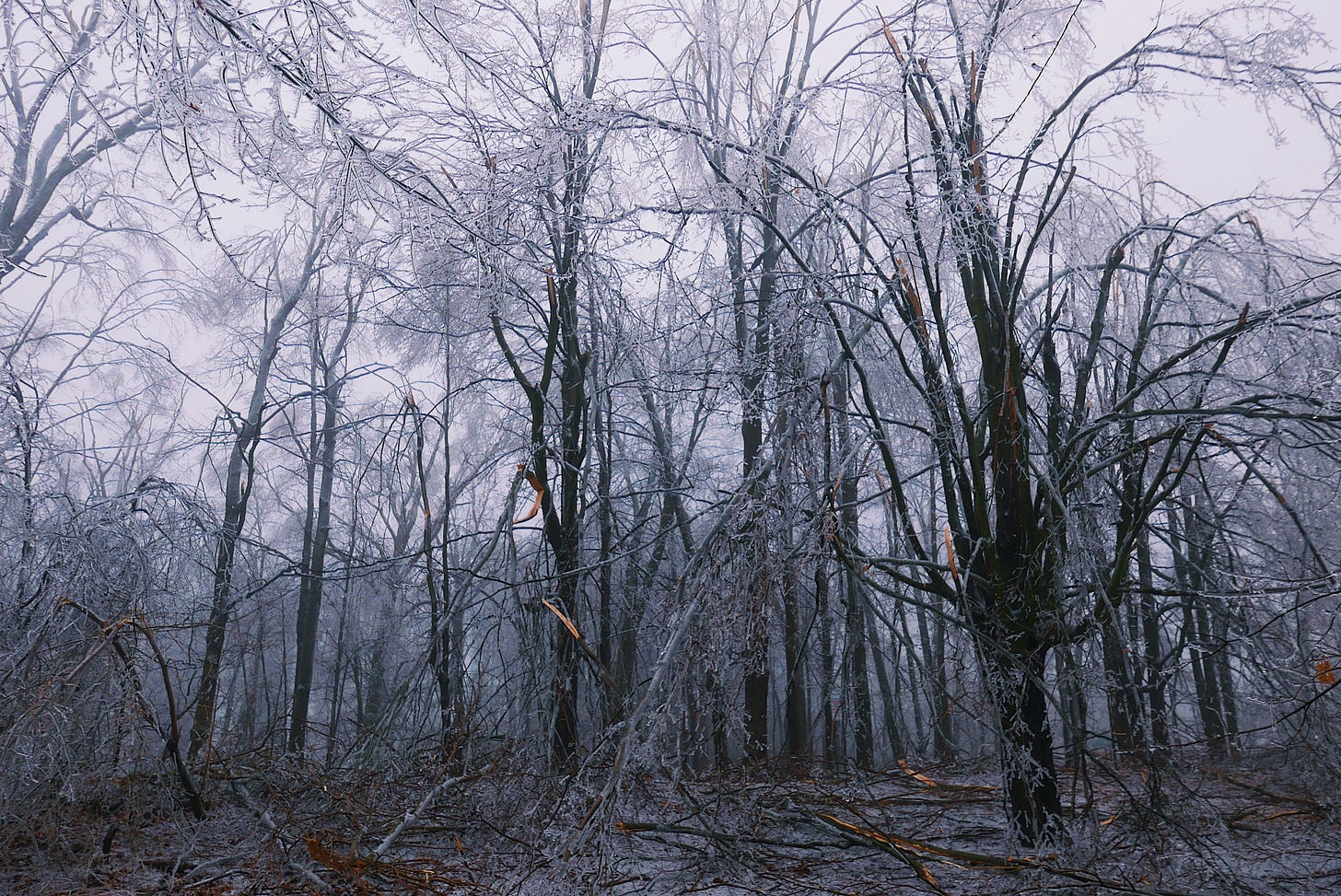The Forgotten Gift Of Empty Space
The power of stillness isn't just in your meditation practice...
Click!
Just like that, everything shuts off.
In the semi darkness of a dusk lit kitchen, my dad turns to me "It's so peaceful. The silence is different without the hum of everything running in the background."
He's right, this quiet is different. This quiet literally bends time. And for the next 51 hours we will get to experience this version of silence accompanied by the soundtrack of falling trees and crystal rain.
During the weekend of no electricity, no internet, and no cell service, I started to re-reflect on the importance of empty space.
The idle time when the brain can breathe. Where it can jump from one though to another without reprimand. No judgement for not staying on a specific topic. A time when the brain can make random connections rather than directed to think in a certain order or a certain way. Where random wonderings can roam free.
This most often expresses as boredom or daydreaming (although those two are often intertwined).
As a child both of these activities used to be a very common part of every day life.
As a kid I remember if vividly: Complaining about being bored and subsequently being told to "go outside". Of course that seemed to be the solution for everything then:
Bored? Go outside.
Rowdy? Go outside.
Friends over? Go outside.
Fighting with my brother? Go outside.
It's Saturday? Go outside.
But I digress.
Looking back now I can see the brilliance of my boredom. There was so much discovery, learning and creativity in those moments. Those are the moments that resulted in writing songs, coming up with inventions, diving deep into a learning rabbit hole.
Back then boredom had a kind of quiet acceptance that accompanied it.
Now it generally has more a tone of underlying frustration due to the background program of "not only am I bored, but I should be doing something productive."
8 years ago I did a mini study into the importance of boredom and allowing the mind to wander for a feature article I was writing. As it turned out, it's really important, so important that I have tried to live it regularly, and find myself writing about it once more.

Why Do We Need To Be Bored?
Great question!
Research has shown that boredom, far from being just an uncomfortable state to escape from, can actually be a powerful incubator for creativity and innovation. Studies indicate that engaging in mundane, repetitive tasks—which naturally induce boredom—can lead to increased creative thinking.
One particular study published in Psychology of Music found when participants were given boring tasks before a creative problem-solving activity, they came up with more original solutions compared to those who jumped straight into the task (Moynihan et al., 2019).
The mind, when deprived of constant stimulation, has the space for and thus instinctively seeks new connections and patterns, almost like a form of cognitive compensation. This process is also known as the incubation effect—taking a mental step back from a problem allows the subconscious to process and generate novel solutions (Csikszentmihalyi, 1990).
Boredom becomes a breeding ground for the mind's wanderings, because it finally has "space". These mental meanderings often lead to creative ideas and/or breakthroughs. It’s in stillness that the mind, given the freedom to roam, stumbles upon unexpected ideas.
The Mind at Play
Much like boredom, daydreaming also gets a bad rep for being an unproductive waste of time. However, it too is an essential cognitive process. When we let our minds wander, the brain’s default mode network (DMN) becomes active, linking disparate concepts and nurturing creative problem-solving (Andrews-Hanna et al., 2014).
One fascinating study found that participants who allowed themselves to daydream—without guilt or judgment—performed better on tasks requiring divergent thinking (Mason et al., 2007). By allowing the mind to meander, we not only refresh our cognitive processes but also foster a sense of mental well-being.
It’s no coincidence that great ideas often strike during a walk, a shower, or while staring at the sky.
Daydreaming during these “idle” moments is far from wasted time—it’s the mind's natural way of making sense of complexity, exploring possibilities, and constructing narratives.
Take Back That Empty Space!
In our hyper-connected world, boredom has become almost a taboo. Stillness has become discomforting to many people. The idea of having to be with our own thoughts, even if just for a moment while a friend uses the restroom during coffee or dinner, has us reaching for our phones for notifications, social media or the news. Any mundane tasks (driving, chores, working out, etc) are filled with podcasts or shows.
But by constantly seeking distraction, we are depriving ourselves of the very mental state that nurtures creativity, mental health, and deeper reflection.
Watching time slow down this weekend to the point of boredom reminded me that it is not something to be solved for and eradicated. The opposite actually, it's something to be embraced.
This weekend I wrote poetry, read, picked up my camera after a 3 year hiatus (as you can see from the photos), and just listened to my favourite music while staring out the window at the chaos ensuing outside.
Remembering, empty space is a doorway, a portal through which the mind, untethered from constant stimulation, can breathe, wander, and create.
Maybe the real magic lies not just in enduring boredom but in actively inviting it. Allowing ourselves to sit with nothingness, to feel the friction of time slowing down. To embrace the quiet where ideas are born.




This is amazing! I don't do boredom much but I knit or crochet to let my mind wander. If I don't get this time, it feels like my head gets to full and hurts. Great article.
Yesss! Thank you for putting these words to this!!